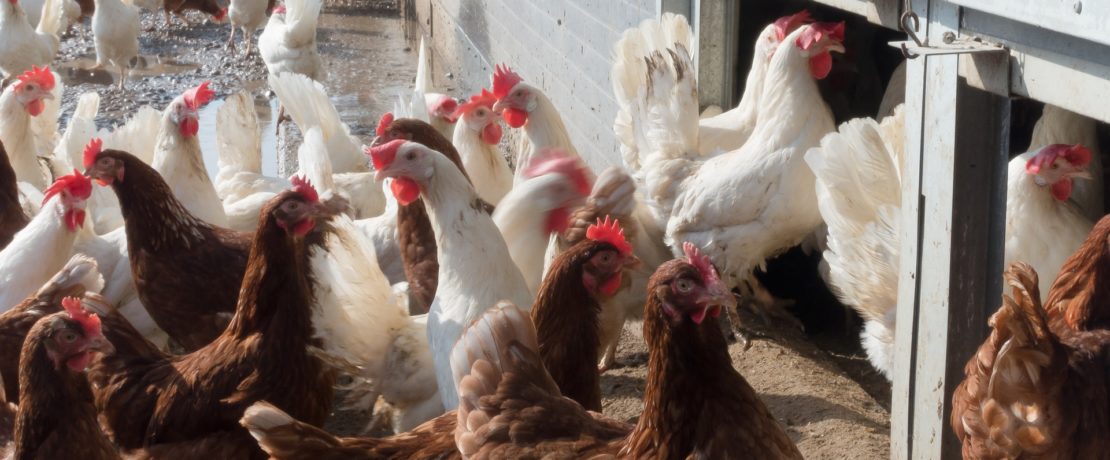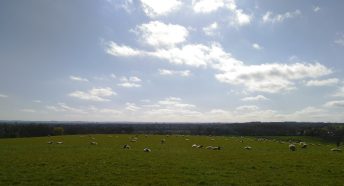Rushden broiler rearing unit
CPRE Bedfordshire has lodged an objection to a planning application for an Intensive Broiler Chicken Factory near Rushden for the production of around 2.4 million birds per year.
We would not normally comment on an application in Northamptonshire but, in our view, this very substantial development proposal is likely to seriously impact the residents of Bedford Borough.
The full CPRE Bedfordshire response can be downloaded at the bottom of the page.
Here we outline our grounds for objecting to the application.
Lack of consultation
The people of Bedford Borough have not been properly consulted on this important strategic application which could have serious impacts on communities in Bedford Borough.
Despite the very large scale and potential impact of the proposed Intensive Chicken Factory on the nearby Bedford Borough communities of Knotting, Knotting Green, Souldrop, Melchbourne, Wymington and Yielden, Parish Councils were not formally informed until the week commencing 20th September. At best this gave them a week to respond before the consultation closed on 27th September.
Water pollution
The map accompanying the applicant’s Manure Management Plan indicates that the majority of the fields where the chicken manure will be spread are in Bedford Borough. The fields stretch from the outskirts of Bedford itself north through the Parishes of Oakley, Milton Ernest, Radwell, Thurleigh, Bletsoe, Sharnbrook, Souldrop, Melchbourne and Riseley.
The majority of the land is located in the valley area of the River Great Ouse or in the valleys of tributaries feeding the Ouse. The River Great Ouse and its valley area is an extremely important environmental feature on North Bedfordshire providing a vital source for drinking water and biodiversity.
Climate Change will make this worse as we can expect many more torrential downpours of rain in the future which will wash nitrates from the manure into the watercourses and into underground water systems. These downpours have already been experienced this year across much of the country. The Manure Plans submitted with this application have not been independently stress tested to take account of Climate Change.
Air pollution
Several gases (e.g. ammonia and nitrous oxide) are emitted from the decomposing process associated with chicken waste. These can cause air pollution which is both an irritant and strong smelling.
DEFRA already has a target to substantially reduce the emission of ammonia gas as part of its 2018 Clean Air Strategy. Intensive farming practices of this sort and scale should be avoided at all cost if we are to reduce these pollutants.
Sustainable development
The proposed development does not conform to the governments stated objective in the NPPF (2021) – Chapter 2, para 7: “The purpose of the planning system is to contribute to the achievement of sustainable development.”
The proposed development of an Intensive Broiler Chicken Factory, producing a huge 2,339,000 birds per year, one of the largest factories of its type in the UK, will do nothing to achieve sustainable development.
The 2019 Report from the Intergovernmental Panel on Climate Change (IPCC), stated that: “producing animal-sourced food (i.e. meat and dairy) emits larger amount of greenhouse gases than growing crops, especially in intensive, industrial livestock systems..” The intensive production of broiler chickens is therefore outdated and runs completely contrary to current thinking – we need to reduce our consumption of meats and particularly intensively reared animals.
Road traffic
The proposed development will lead to substantial additional HGV and Agricultural Tractor/Trailer traffic on the A6 and on the rural road network.
CPRE Bedfordshire full response:
Rushden Northants Response to application 18 01284 FUL Intensive Chicken Factory 26 Sept
This planning application also features on the Compassion in World Farming website.








